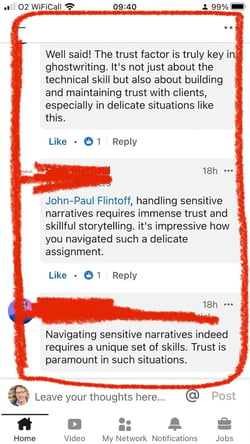Writing on LinkedIn: mostly by bots?
And what next for human writers.
Some months ago, I posted a story on LinkedIn and received some comments in response that were - well, very odd.
The post was about ghostwriting, which I do occasionally. And the comments, in my opinion, were ghostwritten by AI.
They were DREADFUL.
Having allowed some time to pass, I’ve now gone back to look at them and they’re still dreadful.

A bit embarrassing, to be honest.
A good argument for working with a human ghostwriter, at least for the time being.
What follows is more or less my original post about ghostwriting. Then you’ll see I’ve inserted here the weird comments I received.
Ghostwriting isn't just about technical skill.
It's about earning and keeping trust at the highest level.
I worked under three editors-in-chief at the Financial Times
One approached me with an unusual request: Would I interview his wife about a sensitive health matter and write up her story, in her words, for the magazine?
Think about that for a moment. He wanted someone who could do the following:
handle sensitive health information with discretion
interview his wife with empathy and professionalism
navigate writing about the boss's family
maintain journalistic standards while telling a deeply personal story.
I have nothing but good memories of that experience, thankfully. On top of everything else, I received a writing credit.
Typically, with ghostwriting, your byline disappears. It’s as if you didn’t exist. The story belongs to the person who lived it.
But the FT added a line at the end:
- As told to John-Paul Flintoff
What does the ghostwriter want?
Having established what the “client” wants from a ghostwriter (if I may use the word client to describe my editor-in-chief), I turn to a different but interesting question:
What does the ghostwriter want?
If I’m the ghostwriter, I want a story I can bring alive, by grounding abstractions in the concrete, using all five senses: sight, sound, taste, touch and - whatever the other sense is, seem to have forgotten for a moment.
(Haha, my little joke.)
I want a story I can bring alive by finding the emotions, the reason why readers should care, get angry, cry their eyes out, laugh themselves silly etc - AND in what order, because if you start with crying and end with laughter that’s very different from starting with laughter and ending in tears.
I want a story that might otherwise not be told.
I want a story that helps people to see themselves, and each other, in a new light.
Greedy me!
Those weird comments
As indicated earlier, I got some weird comments over on LinkedIn when I posted a version of what you have just read.
Specifically, I received applause in suspiciously similar combinations of key words. I can’t prove that the comments were written by AI. But I think they probably were.
What do you think: